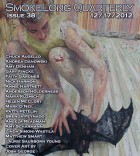The narrator in “Call Me Your Unbroken” is a failed musician, and there are several references to concerts and bands in your stories, a saxophone, a dog named Mozart. How has music informed your life and your stories? (If it has?)
I love music. If given the choice, I’d rather be a piano than a human being. I have no musical ability myself but would love to have been a guitarist in a decent garage band. Sometimes a song will trigger an emotion that finds its way into something I write. Occasionally, the inspiration is more concrete. I’ve been working on a story that begins “Standing on the corner, a suitcase in my hand” which is a direct rip-off of the first line of The Velvet Underground’s “Sweet Jane.” I just love the rhythm of that phrase, and I’m trying to bring that rhythm into my prose. I haven’t been able to do it successfully yet, but I’ll get there eventually. It takes time.
And I love your song title “Sleeping on the Porch with Geraldine.” Are you ever going to write the actual song?
The songs referenced in “Call Me Your Unbroken” like “Sleeping on the Porch with Geraldine” are just song titles that popped into my head. They sounded like songs that might have been on an old Sonic Youth or Pixies album. I wanted it clear that Melissa and the narrator had a strong creative bond, and so I referenced specific songs that they had written together.
When do you know if a story is going to be a short short story or a longer story? Or do you just take the ride until the story ends?
I’ll often start a story with the intention of writing a piece of flash fiction and then realize after 1500 words that I’m not even halfway to the end. But sometimes I start what I expect will be a longer piece and then realize that the heart of the story can be found in only one or two moments, and if I do some serious cutting, a flabby short story transforms into a tight piece of flash. The first draft of “Call Me Your Unbroken” was about 2,300 words. I thought that it worked, and maybe it did, but when I started cutting it seemed clear that the story needed to be short—like a good alt-rock single from the early 90’s.
What made you begin writing stories?
I was a lonely kid with a big imagination. Writing stories become my way of making life more interesting. I had a bunch of imaginary friends before I started school but once you reach a certain age it’s really not acceptable anymore to interact with these imaginary pals. But if you put those imaginary people into a story it becomes normal, or at least normal enough so that parents and teachers won’t start to worry. I was writing stories before I could even write. I had my own language, which I called Scribble, and every week I would write The Scribble News, which was a newspaper detailing the exploits of my favorite stuffed toys. Since my mother couldn’t read Scribble, I would read the stories aloud to her. As I grew older I wrote stories to keep myself entertained. Ultimately, I think I started writing because I enjoyed making things up, and I’ve always had a vague dissatisfaction with life. Put those two facts together and you wind up with someone seriously inclined toward fiction.
What keeps you writing?
It’s fun. It’s also difficult, frustrating, and often discouraging but when you’re working on a story and a good idea or sentence or even just the right word at the right time pops into your head, it’s a definite rush. There have been prolonged periods in my life when I wrote nothing at all, and during those times I sensed the absence like a big dark hole at the back of my brain. I suspect that I move through many aspects of my life with a somewhat limited level of engagement; there’s a lot of sleepwalking in everyday life, but when I’m working on a story, I feel awake. I feel more alive. That might sound ridiculous, but it’s true.



 The core workshop of SmokeLong Fitness is all in writing, so you can take part from anywhere at anytime. We are excited about creating a supportive, consistent and structured environment for flash writers to work on their craft in a community. We are thrilled and proud to say that our workshop participants have won, placed, or been listed in every major flash competition. Community works.
The core workshop of SmokeLong Fitness is all in writing, so you can take part from anywhere at anytime. We are excited about creating a supportive, consistent and structured environment for flash writers to work on their craft in a community. We are thrilled and proud to say that our workshop participants have won, placed, or been listed in every major flash competition. Community works.